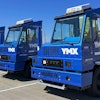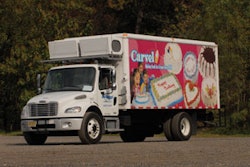Dockworkers at the Port of Oakland had recently shut down two marine terminals because the workers refused to handle potentially explosive refrigerated shipping containers that had been serviced overseas.
And though goods are now moving in and out of the port without delay, it's only because of a new, labor-intensive effort going on behind the scenes -- 24 hours a day, seven days a week.
A handful of clerks from ILWU Local 34 and two mechanics have been working practically nonstop inside a second-floor room at the Pacific Marine Association training facility on Fallon Street to identify and isolate containers that had motors serviced during stops in Vietnam.
And they will continue poring over the lists until they can be sure the danger no longer exists.
"These reefers are still moving all over the world," says Richard Mead, president of the International Longshore and Warehouse Union Local 10.
The problem with refrigerated containers, more commonly called "reefers," came to light this fall when worldwide container companies warned that two people in Vietnam and one person in Brazil were killed by explosions when compressor motors were powered up.
All of the refrigerated containers blamed for the deaths, as well as units that caught fire or had nonfatal explosions, were serviced in Vietnam, according to the Ocean Carrier Equipment Management Association. The cause appears to be the introduction of contaminated gas into the cooling units.
Maersk has removed more than 800 reefers serviced in Vietnam since February. APL also removed 103 units serviced in Vietnam this year. Other container companies have also identified and removed containers.
Fearing for the safety of its workers, the ILWU demanded the maintenance records of all refrigerated containers serviced in Vietnam so those containers could be identified and powered down before being offloaded from a vessel and isolated with other potentially at-risk container units.
A Halloween shutdown of the SSA and Trapac terminals in Oakland occurred when the terminal operators tried to avoid the dockworkers' safety procedures, Mead said.
"We got to the point where we would not work if we felt they weren't telling us the truth (about the containers on board the ship)," Mead said. "It's just crazy for them to expect us to work with exploding containers."
Since then, a safety protocol approved by the ILWU and the Pacific Maritime Association on behalf of the terminal operators has improved the flow of information about containers at all West Coast ports. Still, union members are carefully vetting every reefer on every ship as quickly as possible to keep the cargo flowing through the Port of Oakland.
Frank Riley, of the labor relations committee for ILWU Marine Clerks Local 34, was back at it, although he had still not shaken the stress of working the day before Thanksgiving, when the small crew examined records for about 1,000 reefers to make sure they didn't unnecessarily hold up cargo destined for holiday sales.
"Three weeks ago, nobody knew what the heck to do (to process these containers)," Riley said. "We are trying to do the best we can to maintain Oakland as a primary port and go through the necessary steps to keep workers and the public safe."
It's a complex operation:
- The marine terminals provide a list of all reefers aboard ships headed to Oakland, along with a transit history for each unit for the past year.
- The small crew at PMA's training facility creates a separate list of containers that stopped at 10 ports in Vietnam.
- A mechanic reviews each container's maintenance history to determine if work was performed on the refrigerant system motor.
- The units that didn't have maintenance, or those loaded with dry goods that didn't require refrigeration, are cleared. Units that had maintenance are deemed at-risk, and the terminal operator notifies the ship to power down cargo bays where the units are located and then unplug the individual units.
- Those units -- some of which are empty -- are unloaded from the ship and transported to an isolated area. If requested, stevedores will transfer goods from an at-risk container to a different container, Riley said.
Mead said there are about 100 containers isolated on the yard so far. A unit's insulation will keep the interior cold for days, if not weeks, but nobody has figured out whether the units will be repaired or scrapped, he said.
It has taken longer to resolve the issue of handling refrigerated containers coming into the terminals by truck. Early on the containers were rejected at the gates, causing truckers to miss turnaround deadlines and incur penalties of $250 a day. That is happening less often now that transit and maintenance records are being provided for the containers.
Those problems, combined with the fallout from the Nov. 2 general strike staged by Occupy Oakland, created backlog at the port.
Bill Aboudi, owner of AB Trucking, said November was a very tough month for truckers. His company finally got caught up Friday when it took advantage of the slow work day to return the backlog of empty containers it had sitting in the yard.
"Reefers are an issue, (the) Occupy (movement) is an issue and the holidays are an issue because replacements are filling in for people on vacation," he said. "Every trucking company is so far behind because all the terminals were slammed."
Contact Cecily Burt at 510 208-6441. Follow her at Twitter.com/csburt.



















